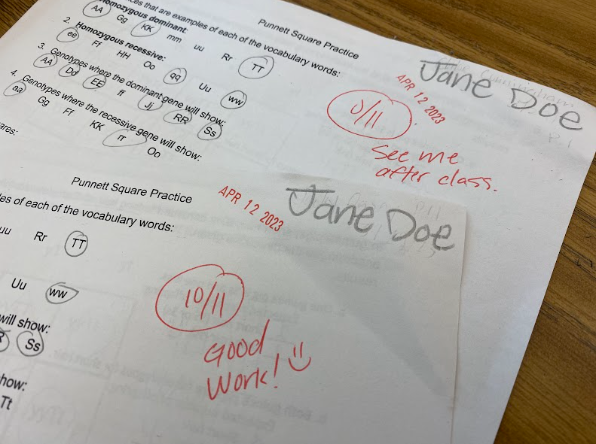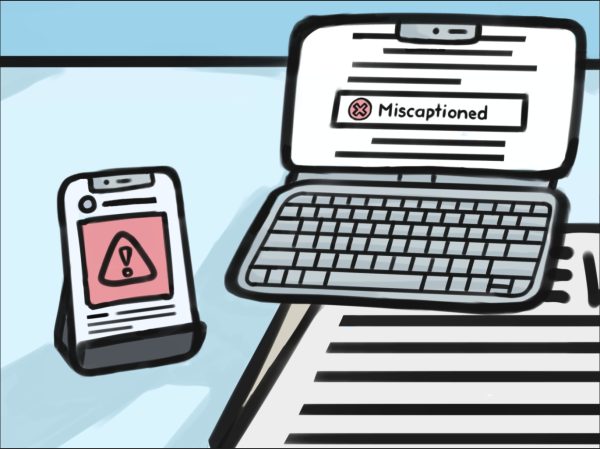Smarter Kids Cheat More

By Jacky Oasay
The consequences of cheating on a test can result in bad test scores, even if the answers are correct.
May 4, 2023
I have grown up in a household where it is believed that if I cannot be the best, then I am the worst. That mindset and pressure have caused me to make decisions that left me with a fake sense of self—a gaping hole of guilt in my conscience, a plague spreading to my face for everyone to see. As I grew up, I noticed kids in my classes had the same problem as me—except guilt was not on their faces, but a shining smile, reflecting the dishonest A on their page.
Recently, my biology class had a test. Before every test, my teacher has us take a practice test to prepare us. Usually, he puts similar questions on the test and sadly, students took advantage of that. The question on the page was about purple flowers, yet a concerning amount of students answered the question with earlobes.
My teacher addressed the disappointment he had in class and how the dishonesty made him feel betrayed. Although he addressed this, it isn’t guaranteed students won’t do it again in the future. These kids were in a higher level class compared to the rest of his periods. Wouldn’t “smarter” kids make trustworthy, honest decisions?
Unfortunately, no—kids that have grown up with that higher standard have been shown to cheat more. Research conducted by The Association for Psychological Science proved that young children being praised for being smart has promoted cheating. In this study, children were told to play a guessing game. When the children did well, one group was praised for their ability, and the other was praised for their performance. Later on in the experiment, researchers left the room and told the children not to cheat by looking at the cards, there were hidden cameras in the room.
According to ProtoctorEdu, a study revealed that 95% of high school students are likely, or do, cheat. Cheating does not only relate to test-taking, but also to asking friends for answers, searching for answers online, and using external resources not given by teachers. Although this rise is concerning and wrong, students wouldn’t cheat for the fun of it.
In these hidden recordings, it was shown that about 40% of the children left unpraised looked at the card. Meanwhile, the children praised for their ability cheated nearly 60% of the time. Although the numbers are close, there is an easy connection between these preschoolers and high school students—the fear of anything undermining their praised success or ability.
The education system has pushed students into focusing on their given abilities rather than their work and performance. The idea of kids being “gifted and talented” has most likely made students question their identities, making them hide behind a facade of high test scores that were achieved in an alternate way. I have had many struggles with this myself.
As I’m growing up, I still find it difficult to keep up with my classmates, even though in elementary school I was praised for always being ahead of my peers and seen as a “top student.” This pressure to keep up and compete with even my closest friends and classmates has led to me dishonest decisions that I’m not proud of. I also feel like I’ve lost a sense of my identity and who I really am as a student because of how focused I am on others when I should be focused on my own grades.
Besides competition, reputation is also at stake. People want to be deemed as the smartest rather than the dumbest, that is a common fact. However, in accelerated classes, it is very easy to recognize who is struggling with the pace and material. Imagine being the slowest fastest animal, or the shortest garden gnome—nobody wants to stick out.
Although it is a struggle to grow out of this system, there is a way to change the future. Instead of praising students for how smart they are, the praise should be directed toward their work ethic and performance. This praise will encourage hard work in every project or assignment. This results in an honest, deserved score.
Something else that should be worked on is asking teachers for help. Students may feel ashamed to ask their teachers for help due to fear or feeling like they should’ve understood the material when given. However, absorbing information is different for everyone. Some may need more practice and help than others, and that should never be frowned upon.
Lastly, promoting a growth mindset is crucial for kids to improve their performance and motivation to do well in school. It is difficult for many to pick something up for the first time and be good at it. For example, when I first started playing an instrument I couldn’t even get a sound out of it. Now, I can hear the improvement and growth. A student’s performance can change even a month from now. Focusing on knowing there is the ability to grow and achieve your goals is better than a dishonest A+.













